8,500-plus Afghans have landed at PHL. Where they all end up is still up in the air
The journey here is the first step in a still-evolving process for vetting, supporting, and resettling those who managed to flee life under the Taliban.
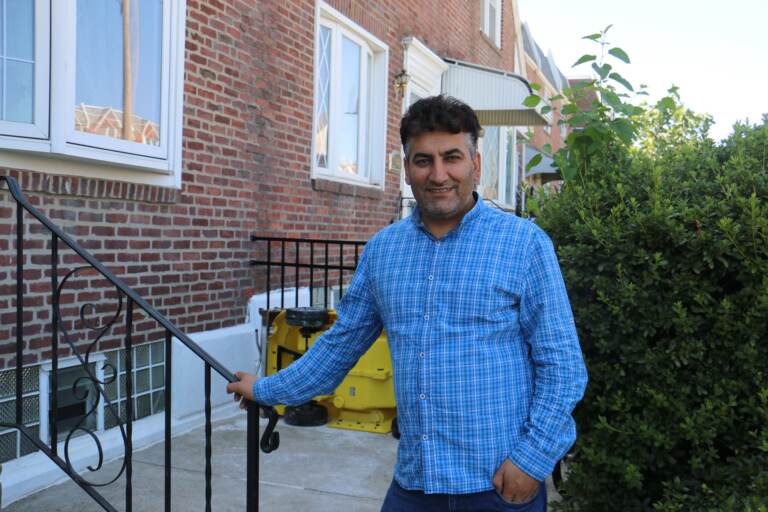
Mohammed Sadeed worked for the U.S. government in Afghanistan before emigrating in 2019. He now lives in Philadelphia and is helping Afghan refugees arriving at the Philadelphia airport. (Emma Lee/WHYY)
More than 8,500 Afghan evacuees have touched down in Philadelphia, according to city officials.
But the journey to Philadelphia International Airport is just the first step in a still-evolving process for vetting, supporting, and resettling thousands who managed to flee in what experts say is a once-in-a-generation event.
“Evacuating 125,000 people or whatever it is from right under fear of enemy fire … is not a normal situation here,” said Margaret O’Sullivan, executive director of Nationalities Service Center, one of two refugee resettlement organizations working with Afghans in Philadelphia.
Some of those whisked out of Afghanistan in the final days of the U.S. occupation were American citizens or green card holders, but the majority of those evacuated to this country or to military bases around Europe and the Middle East were not, according to a Department of Homeland Security spokesperson.
That group consists of U.S. collaborators, people who worked for NGOs or the media, and unaffiliated Afghans fleeing life under the Taliban. In the haste to get as many people out as possible, evacuees from many backgrounds were thrown together and scattered across the evacuation sites.
Mohammed Sadeed, who arrived in Philadelphia in 2019 on a Special Immigrant Visa after working in the U.S. Embassy in Kabul, said his wife and children are some of those stuck in limbo. He went with them for one last visit to see family in Afghanistan before the U.S. withdrawal and returned solo on Aug. 4. His wife and children planned to stay another month, believing reports that it would take several months for the Taliban to retake the country.
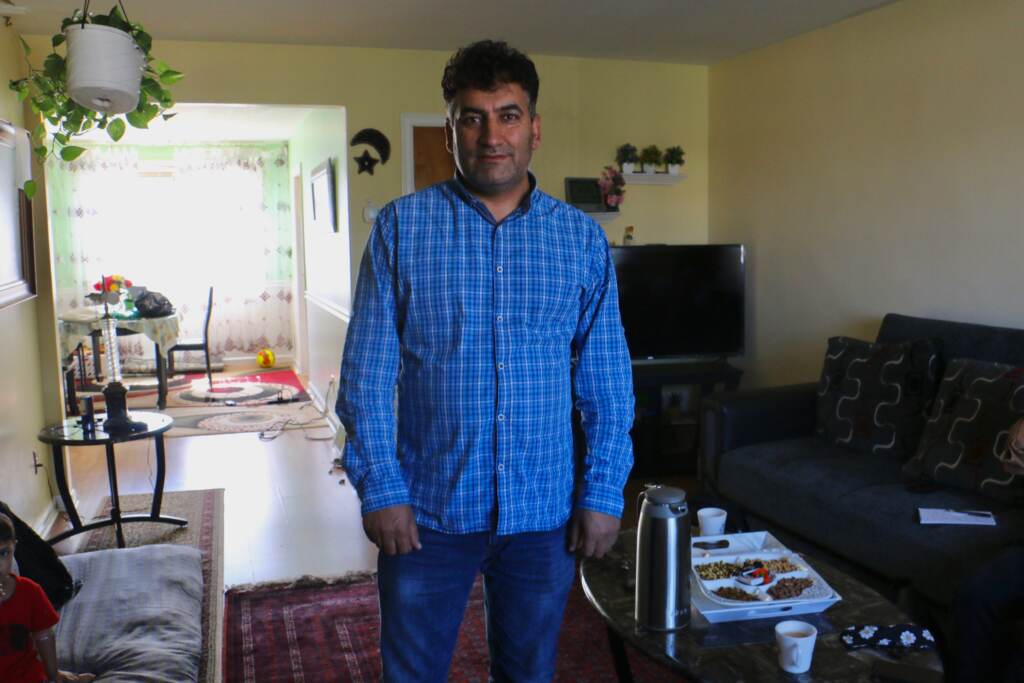
Instead, they became trapped as Kabul fell, unable to get through Taliban checkpoints and into Hamid Karzai International Airport, despite having green cards. Eventually, one of Sadeed’s brothers posed as the head of the family to get them through.
Though they are lawful permanent U.S. residents, Sadeed’s wife and their five children have been stuck at a base in Germany since the evening of Aug. 25.
Sadeed, who is the office manager for the refugee resettlement agency HIAS Pennsylvania, has been working as an interpreter at PHL, translating from Dari to English to help process the thousands of arrivals and to keep an eye out for his own family. At night, he talks to them on the phone and sends documents from his time working for Americans in Afghanistan, anything that might bolster their case for a swift return.
“I have to know when my family will be back, because [the kids] have school. They are behind,” he said. “Just tell me they will be coming back … so I can calm myself,” he said.
As of Monday night, he was still waiting. His family made it to Dulles International Airport in Washington, D.C., but he could not figure out how to meet them. After being up for more than 24 hours, he planned to take a nap in his van while waiting for more information.
“I’m emotional,” Sadeed said.
At PHL, he works with other interpreters from as far away as California, trying to support fellow Afghans. As someone with colleagues and family currently at risk in Afghanistan, he said, seeing so many people arriving who do not have U.S. ties is frustrating.
“I’m happy for them, but what will be the situation for those people like my brother?” Sadeed said.
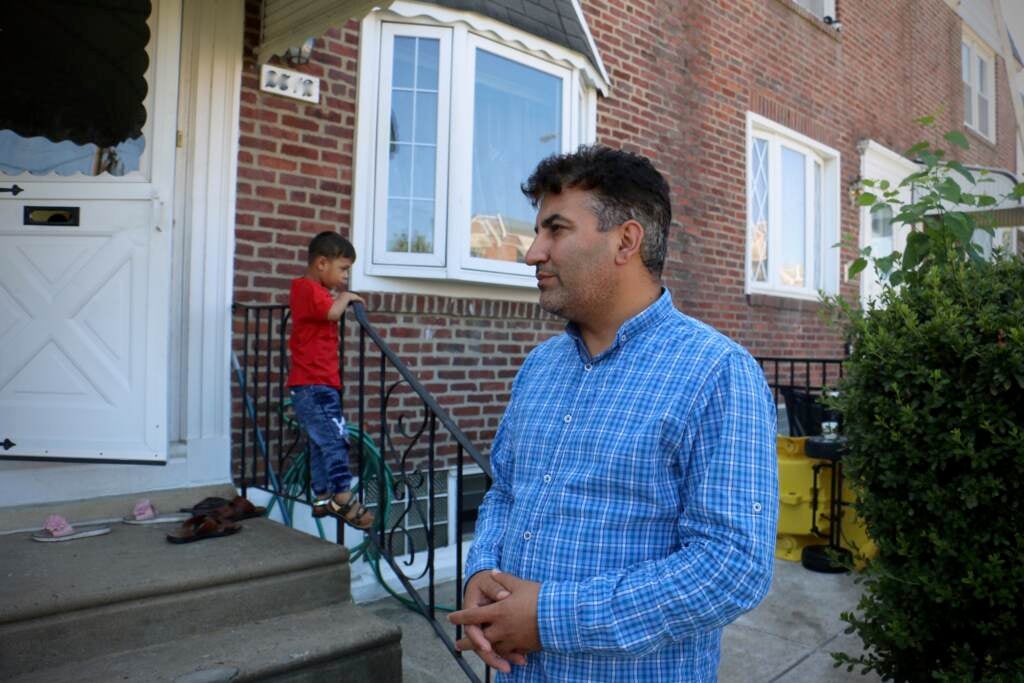
His other brother worked with the United Nations mission for 17 years, and is currently in hiding in Afghanistan. In that job, he served food to 700 prisoners of the U.S. and its allies, said Sadeed. Now, the prison is empty, and Sadeed fears his brother will be targeted by any one of those who know his face and be killed.
Sadeed wants the U.S. government to provide a clear process for protecting the thousands of allies like his brother, so they can make a plan to escape. Tell them whether to go to a third country and apply to come to the U.S. from there, he said.
For now, “they are between a rock and hell,” said Sadeed.
Processing, and more processing
Afghans who make it onto planes leaving Afghanistan and arrive in Philadelphia face more unknowns.
Upon arrival, Afghan evacuees receive a COVID-19 test and give basic information about who they are. They also are also offered vaccinations against the virus.
At that point, U.S. citizens and green card holders are free to go, according to a DHS spokesperson. Everyone else heads to U.S. military bases for more processing. The Department of Defense declined to say how many Afghan evacuees are at Joint Base McGuire-Dix-Lakehurst in Burlington County, New Jersey, but did say that 1,200 service members have been sent there to help with temporary housing and food distribution. The total capacity of housing in the base’s Liberty Village is up to 10,000, according to a spokesperson, Master Sgt. Andrew Satran, who directed questions about evacuees to DHS. DHS did not provide that number in time for publication.
At the bases, the speed of a harried international evacuation runs into the slow-moving machinery of the U.S. immigration system, where applying for a visa under normal circumstances can take months or years. To stay in the U.S. legally, Afghans at the bases must apply for one of three types of status: a Special Immigrant Visa, for Afghans who worked directly with the U.S. government and their families; a Priority 2, for others who worked with U.S. forces or their partners but don’t qualify for SIV; or humanitarian parole, essentially a catch-all for everyone else.

That last program is still taking shape, and while it provides work authorization and a stipend for arrivals, it does not have the same financial support or legal guardrails as more established programs. Moving people through the system more quickly so they don’t languish at military bases, and making sure there is enough funding to keep traumatized refugees from falling into poverty or becoming stateless while in the U.S., could take congressional action.
“We need to make sure that people … have a shot at a sustainable life, or otherwise what are we doing?” said O’Sullivan. In case there are shortfalls in funding, her group is raising money to make sure it can successfully support new arrivals.
Local refugee resettlement agencies HIAS Pennsylvania and Nationalities Service Center said they have been told that the time between arrival at the military bases and when Afghans will be released to their care is between 15 and 30 days. At that point, they’ll have to move fast.
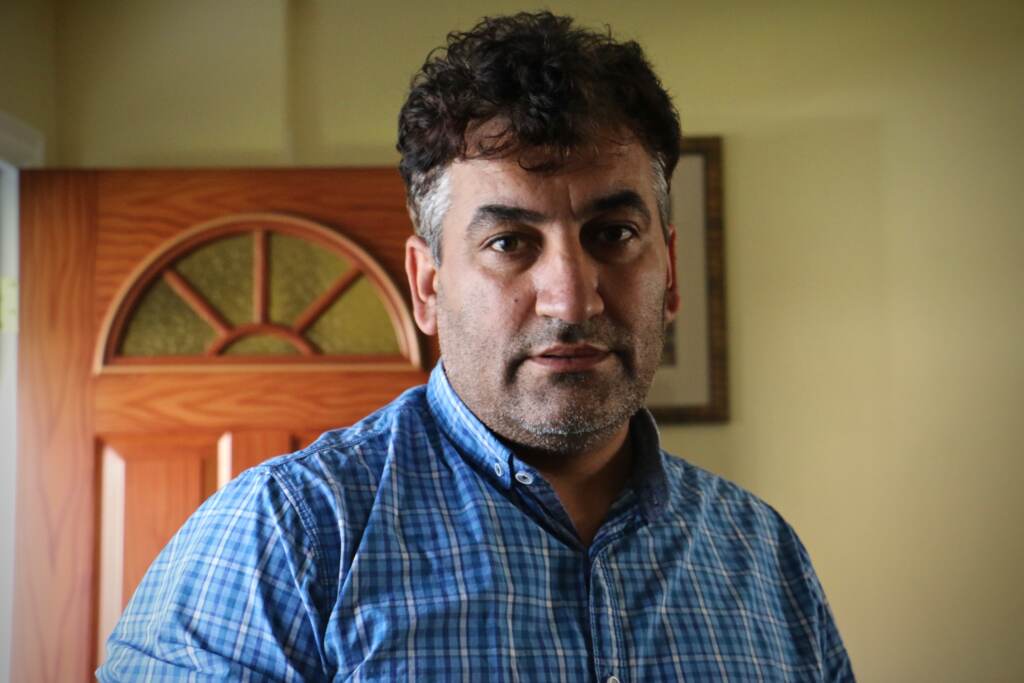
“We have been told that, number one, we won’t be given much notice,” said Cathryn Miller-Wilson, executive director of HIAS Pennsylvania. That means lining up affordable housing and support services that can be activated in a few hours.
The support is crucial, because the federal government gives most refugees a very short runway to becoming self-sufficient: 90 days. In the first 24 hours, everyone placed with the agency must see a doctor and get a Social Security number. Within about two days, “we’re supposed to give them a cultural orientation, open up their first bank accounts, give them financial literacy lessons,” said Miller-Wilson.
Each refugee receives a $1,200 stipend for 90 days, and by the end of that period must have affordable housing and a job that can cover the expense. This rapid-fire assimilation process is made more challenging because of the sheer number of people now in the pipeline. Between Aug. 17 and 31, more than 31,000 evacuees arrived in the U.S., according to the Department of Homeland Security.
“We are concerned that our staff is going to be very overwhelmed,” said Miller-Wilson.
The ranks of volunteers willing to help have swelled, and the agency is also looking into borrowing refugee resettlement staff from other parts of the country not receiving Afghans to see if they can help out in Philadelphia.
With so many details still unknown, “I think we’re just going to have to show a little grace,” said O’Sullivan.
Correction: A previous version of this article overstated the stipend refugees receive.

Get daily updates from WHYY News!
WHYY is your source for fact-based, in-depth journalism and information. As a nonprofit organization, we rely on financial support from readers like you. Please give today.


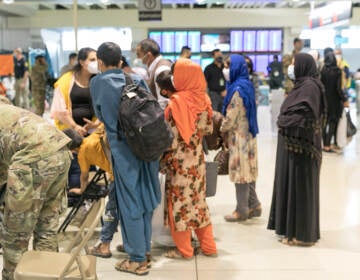
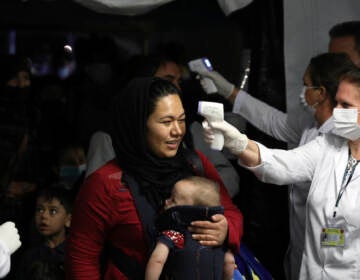


![Heminghaus.PHL Airport PressCon_007 Philadelphia mayor Jim Kenney. A press conference at Philadelphia International Airport about the ongoing Operation Allies Welcome as the airport welcomes more than 25,000 Afghan evacuees. [DANIELLA HEMINGHAUS]](https://whyy.org/wp-content/uploads/2021/10/Heminghaus.PHL-Airport-PressCon_007-360x280.jpg)